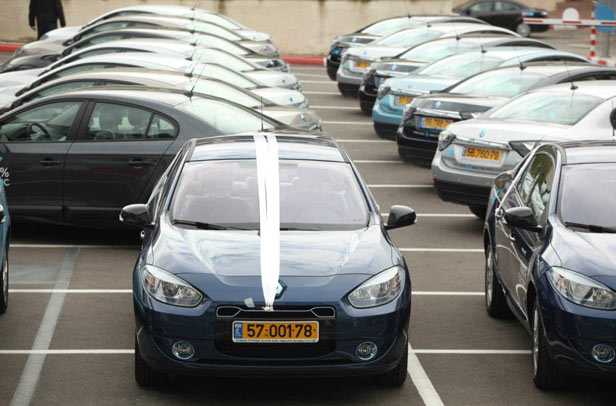Better Place Launches Electric Fleet in Israel

In four years, the electric-car company Better Place has traveled from startup to starting line. Last week, a fleet of 100 electrically powered Renault Fluence ZE sedans set out in a caravan along Israeli highways, signaling the start of the company’s efforts to reach a wide swath of consumers.
The cars are fueled by 225-kilogram lithium-ion batteries with a range of 160 kilometers. The batteries can be recharged at home or swapped for fully charged ones at a network of robotic battery-switching stations that Better Place has built throughout Israel to let owners extend their cars’ range.
The switching stations, plus apps that guide a driver to them, are what make Better Place’s business unique. In Israel, gas is expensive, and there are also high taxes on gasoline-powered cars, making electric vehicles more attractive.
Agassi predicts that by next year, electric cars will be the best-selling vehicles in both Israel and Denmark. Those, along with Australia, are the nations where the service is being launched this year.
The 100 new cars that took the road last week are all for Better Place employees, although a company spokesman says employees will pay to lease them just “like everyone else.” About 70 cars were on the road already.
The Fluence ZE (for zero emissions) is a pleasure to drive. Smooth and silent, the car glides easily past the speed limit on Israel’s fastest highways. Its navigation system can provide directions to the nearest battery-switching station at any time.
Better Place has won some important endorsements for its business model, which remains largely unchanged since the company was founded in 2008. Last November, it raised $200 million from investors, bringing the total it has raised to around $750 million. The company is now valued at approximately $2.25 billion.

While some skepticism still surrounds the venture, two car leasing companies in Israel have recently signed on.”We think switchable EV is more appealing … for the consumer because it solves the range issue and makes the cars much more economic,” says Anthony Bernbaum, the global head of direct principal investments at HSBC, which has so far sunk $150 million into the company. “We believe switchable EV will be the more enduring business model.”
Most automakers are working on hybrid vehicles or electric vehicles using proprietary battery packs that don’t pop out. That’s left Better Place as the only large commercial venture betting on battery swapping. “The biggest surprise I have in the last four years is that we were left to our own to build a four-year advantage,” says Agassi.
Competitors could emerge if Better Place finds commercial success. Agassi says the company plans to use the money it has raised to set up networks in more European countries, possibly France and Germany. That means plans for launches in Hawaii, China, and California will likely be put on the back burner for the time being.
“Everybody is waiting for them to prove the model,” says Sam Jaffe, an analyst in renewable and distributed energy strategies at IDC Energy Strategies. “There are a lot of people following what they’re doing very closely.”
Keep Reading
Most Popular
Large language models can do jaw-dropping things. But nobody knows exactly why.
And that's a problem. Figuring it out is one of the biggest scientific puzzles of our time and a crucial step towards controlling more powerful future models.
How scientists traced a mysterious covid case back to six toilets
When wastewater surveillance turns into a hunt for a single infected individual, the ethics get tricky.
The problem with plug-in hybrids? Their drivers.
Plug-in hybrids are often sold as a transition to EVs, but new data from Europe shows we’re still underestimating the emissions they produce.
Stay connected
Get the latest updates from
MIT Technology Review
Discover special offers, top stories, upcoming events, and more.